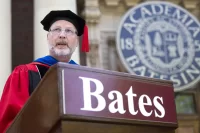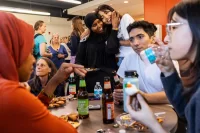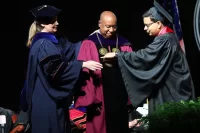
Bates named Fulbright Top Producer for 10th straight year
“When a Bates student is going for something, working toward something, the faculty and staff want to help them get there,” says Robert Strong, director of national fellowships at Bates.
In other words, behind every successful fellowship recipient is a veritable pit crew of support. And the crew is taking a victory lap these days, after Bates was recently named a Top Producer of Fulbright Student awards for the 10th straight year.

This year’s honor recognizes the 10 Fulbright Student offers to Bates seniors and young alumni last spring to support a year of English-language teaching or research abroad during 2020–21. In addition to a decade of Top Producer honors, Bates was named the nation’s No. 1 producer of Fulbright Student awards, with 24, in 2020.
“We are proud to be recognized once again as a Top Producer of Fulbright Student awards, and proud of the amazing teamwork behind this success: the talented Bates faculty and staff who contribute hours and hours to mentor and support students who seek highly competitive postgraduate fellowships and awards such as the Fulbright,” said President Clayton Spencer.
She added, “A full decade of Fulbright success underscores what Bates is so very good at: helping students align their identified interests and talents with purposeful work — in the case of our Fulbrights, an opportunity to make meaningful, immediate, and positive contributions to our world.”
The pandemic, of course, has posed great challenges for this year’s Fulbright recipients, including country-by-country deferrals, delayed starts, and in-country distancing.
“This year’s grantees juggled every possible COVID wrinkle across multiple organizations and agencies on an international level,” said Strong. “But they were all in with their dedication to enhancing global intercultural understanding during a most challenging year for the planet.”
Strong points to a matrix of mentoring that supports both Fulbright success and Bates’ overall fellowship efforts.
“Students have available to them an intense and loving mentoring relationship from faculty and staff who are willing to put in a tremendous amount of work and time talking to students about their academic goals and their career goals,” says Strong. “It doesn’t happen the same way everywhere else. This is why we do so well: People here are willing.”
Importantly, mentoring is a continuing conversation — not a one-and-done — that takes place “on multiple points along an arc.” A mentor and a student have a conversation, maybe on Zoom these days, to discuss interests and challenges, “with questions and answers back and forth.”
Then the student heads out into their Bates experience, taking classes and doing their work and their extracurriculars — and they’re doing self-reflection and metacognition about the challenges. “Then they can return again to a conversation with a mentor.”
Mentoring is an “organic and ongoing process,” Strong adds. “It’s not just two people: it’s coaches, faculty, staff, and me. And then there are students’ friends in Commons. Because we’re all growing all the time and all being challenged. And it should be fun — and when it’s fun, we’re successful.”
The world’s largest and most diverse international educational exchange program, the Fulbright marks its 75th anniversary this year.
Since the Fulbright program’s inception in 1946, more than 400,000 people from all backgrounds — recent university graduates, teachers, scientists and researchers, artists, and more — have gained an expanded worldview, a deep appreciation for their host country and its people, and a new network of colleagues and friends through the Fulbright program.
Fulbright alumni include 60 Nobel Laureates, 88 Pulitzer Prize winners, 75 MacArthur Fellows, and thousands of leaders across the private, public and non-profit sectors.




